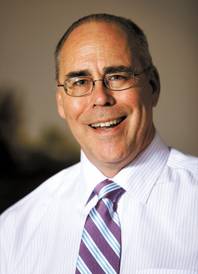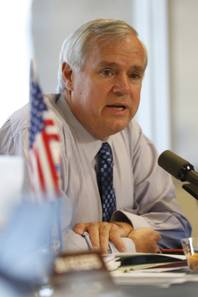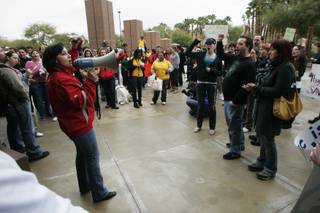
Instructor Rhigel Alforque-Tan teaches Medical/Surgical Nursing inside the Bigelow Health Sciences building on the campus of UNLV in Las Vegas Monday, March 1, 2010.
Wednesday, March 3, 2010 | 2 a.m.
By the numbers
6.9% -- The drop in state funding for UNLV and the rest of the state’s university system approved by the Legislature. University officials will do a review of all academic programs, and as many as seven might be eliminated.
380 -- The number of students enrolled in the School of Nursing at UNLV — 200 undergraduate students, 150 master’s students and 30 doctorate candidates. The program is one of the most successful at UNLV.
$5 million -- The annual operating budget of the nursing school. It’s relatively expensive because of clinical settings and low student-faculty ratio required for accreditation. It also brings in about $1 million a year in grants.
Related stories
- Budget gets OK as session ends; sales tax extended for roads (2-28-2010)
- UNLV students let their voices be heard on proposed education cuts (2-10-2010)
- Hundreds rally to protest governor’s proposed budget cuts (2-9-2010)
- The bleeding of education: Gibbons faults ‘whining’ about school funding (2-9-2010)
- As budget cuts loom, UNLV lacks requested program rankings (2-8-2009)
- College students band together, rally against budget cuts (1-22-2009)
- Rogers to budget cut protestors: Glad you’re here (12-4-2008)
Raw video of rally
Of all the deans at UNLV whose schools may face painful budget cuts, you might think Carolyn Yucha would get a free pass. Her School of Nursing is one of the most successful on campus. In a state starved for more nurses, nearly 96 percent of UNLV’s nursing students passed the national certification licensure exam in 2009, 7 percent better than the national average.
So the fact that the nursing school is being considered for cuts — or even more implausibly, outright elimination — might seem hard to fathom.
But Yucha knows her program is a target because it is one of the more expensive academic programs at UNLV. Training nurses is intrinsically more expensive than teaching English literature or math.
And so even as the university president was hosting a campus town-hall meeting Tuesday with students to kick around what kinds of cuts UNLV needs to make to satisfy the demands of the Legislature, Yucha was bracing herself for a hit.
Maybe she could close the pediatric nurse practitioner master’s program. After all, it’s only getting about four applicants annually, and it could take twice that many to be most efficient. Lopping it off would save $120,000 — the cost of one faculty position — she figured.
That kind of savings won’t make much of a dent, but Yucha says it’s the only low-demand program in her school. Cutting other nursing programs would reduce enrollment at a time when the community needs more nurses, she said.
“No matter what we do, or what the president ends up deciding, someone’s going to say the wrong thing was cut,” Yucha said. “We just have to make the best case we can for ourselves.”
UNLV administration has identified the School of Nursing as one of the university’s 20 most expensive programs, and those most susceptible to budget cuts in order to meet a 6.9 percent reduction in state funding for higher education. That target was adopted by the Legislature in special session, and comes on the heels of budget cuts totaling 24 percent at UNLV since 2007.
Many less expensive campus initiatives have gotten the ax. This time around, UNLV is aiming for fiscal prudence and expediency.
“The smaller the cost of the program, the more of those you’re going to have to eliminate to hit the target,” UNLV Provost Michael Bowers said. “We thought it would be most efficient to look at the top 20.”
In the coming weeks, Bowers will meet individually with deans to discuss each program’s relative merits.
“We’re going to look at faculty productivity, scholarly output and how critical the program is to the university’s mission,” Bowers said. “What kind of contribution does it make to the community?”
Yucha is ready to make her case.
The nursing program, with 200 undergraduate students, 150 master’s students and 30 doctorate candidates, operates on an annual budget of about $5 million. It’s relatively expensive because of the clinical settings and low student-faculty ratio required for accreditation. Bumping up class sizes to save money isn’t an option.
On the flip side, the nursing school brings in about $1 million annually in research and educational grants.
Greg Hylander, a senior nursing student at UNLV, said he moved to Las Vegas from Massachusetts specifically to enroll in the program, in part because its strong reputation should help him land a job more quickly than if he had graduated from elsewhere.
And that’s another factor that should weigh in the nursing program’s favor during the evaluation process — graduates are practically assured of getting good jobs.
For that reason, Yucha suggests that rather than cut her program, the cost of tuition for nursing students should be increased as a way to close the budget gap.
The cost of private nursing degree programs locally are from two to three times as expensive as UNLV.
“Given that not many other educational programs can make that kind of guarantee (of postgraduate employment), it seems reasonable to me that students should pay more,” Yucha said.
The state’s colleges and universities charge students the same tuition regardless of the academic field they pursue. Shortly after being appointed president of UNLV last summer, Neal Smatresk said he wanted to pursue the possibility of moving to a system of differentiated tuition, which would take into account the costs associated with specific programs.

UNLV President Neal Smatresk
Holli Hall, another senior nursing student at UNLV, said she supports different levels of tuition, particularly if it means an even higher level of instructional quality.
“I would expect to be that much more prepared when I get out in the real world,” Hall said. “A higher price for a better education — I’d be more than willing to pay for that.”
The alternative — to cut the nursing program — is a shortsighted option, she says. The state’s nursing shortage is one of the nation’s worst, and if UNLV were to turn out fewer graduates “it would put a larger strain on nurses who are currently working and contribute to more burnout,” Hall said. “That’s only going to mean a worse situation in the end.”
On Thursday, with the backing of the state’s higher ed presidents, system Chancellor Dan Klaich plans to broach the topic of differentiated tuition with the Board of Regents, whose approval would be needed.
Such a policy would have to be adopted systemwide, Klaich said.
“If there were a higher fee for nursing students at UNLV, it would have to be higher at UNR,” Klaich said. “I don’t feel comfortable imposing higher costs on a student just because they live in a different area.”

Chancellor Dan Klaich
Differentiated tuition, which is growing in popularity nationally as many states struggle with severe budget shortfalls, “is an important piece of our overall ability to become more self-sustaining,” Klaich said.
But for now, the urgent focus is budget cuts.
The regents have laid out much of the process for reviewing academic programs, and individual campuses will use those guidelines. UNLV’s Faculty Senate on Tuesday will vote to elect six of its members — five from the academic disciplines and one administrator — to serve on an evaluation committee. They will hear presentations from each program and make recommendations to the provost and president. As many as seven departments will face elimination.
“In a very real way, this is collaborative governance,” said John Filler, chairman of the Faculty Senate. “Our job is to step up and work with the administration.”
He described the mood on campus as apprehensive, noting, “people realize the university is at stake. Some of our best programs are on that list — the question is whether or not the state can afford the quality.”
UNR President Milton Glick on Monday released a preliminary list of programs being considered for cuts at his campus, including reorganizing the College of Agriculture, Biotechnology and Natural Resources, and eliminating some degree programs including animal science, applied economics, German, French and Italian.
Though the process will be painful, Glick pointed out that it’s better than the alternative — having the higher ed system be forced to declare financial exigency, which would mean acknowledging there isn’t enough revenue to meet expenses. That move might allow campus presidents to move more quickly because personnel contracts could be more easily adjusted, but it would have one big drawback.
“We would become the national poster child for a failed higher ed system,” Glick said. “Program reviews are just the healthier way to go.”
UNR Professor Eric Herzik — chairman of both the political science and the math departments — said he’s expecting significant scrutiny with multiple levels of review.
“If your program is cut you’re going to be unhappy, but we don’t want this to be arbitrary,” Herzik said. “We’re also trying to avoid an attitude of, ‘you cost a lot, so you’re gone’ or ‘you’re small, so you’re gone.’ A program might be small and outstanding. We’re trying to preserve that balance.”
Two years ago, as the state’s budget crisis began, Herzik was called in to defend the university’s Basque studies center. The program ended up surviving with reduced funding and the loss of two full-time staff positions.
But this time around, “It’s a question of what we can live without,” Herzik said. “Instead of, ‘Can I justify my program’s existence?’ it’s ‘Do we lose German or resource economics or speech communications?’ We’re not going to solve this by nipping around the edges. People will be laid off.”



Join the Discussion:
Check this out for a full explanation of our conversion to the LiveFyre commenting system and instructions on how to sign up for an account.
Full comments policy